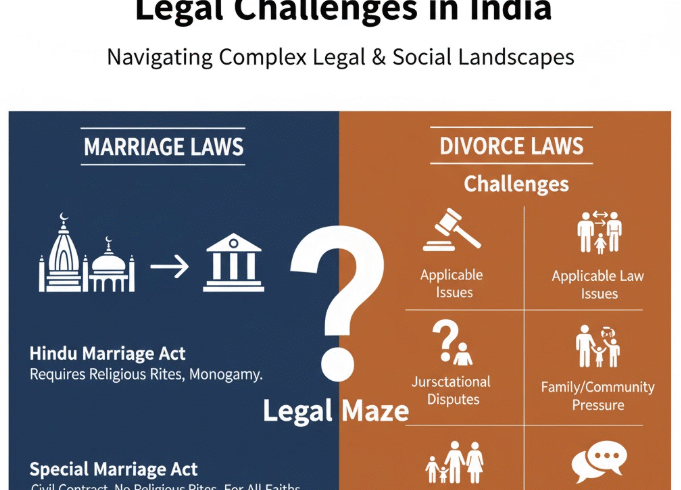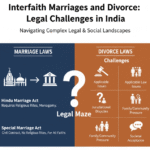5 Legal Mistakes To Avoid When Going Through A Divorce In India
Divorce is never easy. It’s a rollercoaster of emotions putting your patience, endurance and judgement to the test. In India, where marriage is viewed as a holy covenant, the process of divorce can be even more trying. But here’s reality: While a broken heart is inevitable, legal slugfests don’t have to be.
Year after year, an increasing number of Indians commit expensive mistakes during their divorce—missteps they could have avoided with the right information. Such mistakes don’t only cost you money but can also wreak havoc on your future, how well your children do and even how at peace you feel years from now.
Whether you are seeking divorce under the Hindu Marriage Act, Special Marriage Act or any other personal law in India, our comprehensive guide will help you learn how to approach the legal complexities. We’re going to tell you about five huge mistakes people tend to make — and show you how, specifically, not to make them. Consider this your accessible road map to an easier divorce.
Mistake #1: Concealing Assets or Income from Your Spouse
One of the most common mistakes people make during divorce is attempting to hide cash, property or other assets. You may imagine you’re getting away with something by passing money to a relative’s account or “forgetting” to mention that ancestral property. But here’s what really happens: you get busted, and the consequences are severe.
Why People Hide Assets
The logic appears simple at first. No one wants to give their hard-earned money or valuable possessions to someone they are breaking up with. Some people put assets in their parents’ names, open hidden bank accounts or report lower incomes than they have. Others may stow away jewelry, investments or even business interests.
What Indian Law Says
In Indian family law, both parties in a relationship have the legal right to be informed about the full extent of each other’s financial position during divorce. That is unless you are filing under:
- Hindu Marriage Act, 1955
- Special Marriage Act, 1954
- Indian Divorce Act, 1869 (Christians only)
- Parsi Marriage and Divorce Act of 1936
- Muslim personal law
The court can also direct both parties to file sworn affidavits of their individual assets, income, bank accounts, investments and real estate. If you lie on those documents, that’s perjury — a crime.
Real Consequences You’ll Face
| Consequence | How it Affects You |
|---|---|
| Contempt of Court | Up to 6 months in jail or a fine. The judge won’t believe anything else you say. You can lose custody / have less alimony / have more maintenance charges. |
| Criminal Charges | You can be charged for perjury. |
| Asset Seizure | The court can put a lock on your hidden assets once they find it. |
How to Do It Right
Be brutally honest about money right from day one. Prepare a comprehensive list of:
- All types of bank accounts (savings, current, fixed deposits)
- Property owned (residential, commercial, agricultural)
- Investments, including mutual funds, stocks, bonds and insurance policies
- Jewelry and valuable items
- Business interests or partnerships
- Pension and provident fund account statements, if you have any
- Loans given to others
- Digital assets and cryptocurrency
Remember, transparency isn’t weakness—it’s strategy. Honesty goes a long way with courts, which are much more likely to hear you out when you have leveled with them.
For expert legal guidance on divorce matters, visit Zista Legalis.
Mistake #2: Fighting for Everything and Not Thinking of Your Kids
Should you fight at each battle along the way?
When feelings are running high, many parents treat their divorce as a battleground. They go to war over everything—the house, the car, the furniture—without thinking of what it does to the kids. This mistake can leave a permanent stain on your children’s mental health and your relationship with them.
The True Price of Fights Without End
Children are incredibly perceptive. They know when their parents are fighting, even if you think you’re doing it under the radar. Studies indicate that children from high-conflict divorces are prone to experience:
- Anxiety and depression
- Poor academic performance
- Problems establishing healthy relationships into adulthood
- Low self-esteem
- Behavioral problems
What Indian Courts Prioritize
Under Section 26 of the Hindu Marriage Act and other personal laws in India, Indian courts always consider the welfare of the child paramount. The judge will consider:
- The child’s age and gender
- The child’s own desires (if they can express them)
- Fit between each parent’s care
- The moral and physical atmosphere the father and mother present
- Education and emotional needs of the child
Smart Approach to Child Custody
Instead of a battle, experiment with collaboration in parenting. Here’s what works:
Work out a comprehensive parenting plan that details how every schedule will be implemented (school-related decisions, doctor’s visits, religious upbringing and vacation time) in day-to-day activities. The plan must be feasible and flexible enough to adapt as your child gets older.
If both parents are fit and willing, consider joint custody. Research suggests children usually do better when both parents take an active role in their lives.
Do not allow your child to become a pawn in court battles. Do not make your child your messenger, spy or weapon against your ex-spouse. Even if you are very angry, never speak negatively about the other parent in front of your children.
Child Support Guidelines in India
| Factor | What Courts Consider |
|---|---|
| Basic Needs | Food, clothing and shelter |
| Education | School fees, books, tuition and extracurriculars |
| Health Care | Medical insurance or doctor’s visits |
| Parent’s Income | Generally 25-30% of the paying parent’s income |
| Child’s Age | Small children require more physical care |
| Standard Of Living | The standard of living in which the child lived before parents’ divorce |
Mistake #3: Skipping The Appropriate Legal Documentation
A lot of people think that if they cut a lawyer out or try to do everything based upon a verbal agreement, that it saves them money. This is the equivalent of erecting a house without a foundation—the house will fall. If you don’t have the paperwork, you’re NOT covered.
The “Friendly Divorce” Trap
You and your partner may currently be on good terms. You shake hands and agree on support, asset division, custody. Everything seems perfect. But what happens when:
- Your former spouse gets cold feet on the deal?
- Financial circumstances change?
- New partners enter the picture?
- Your ex is moving to another city or country?
Without a legal document, you have no means of enforcing what you agreed to.
Essential Documents You Must Have
Petition for Divorce: This is how you ask the court permission to divorce. It has to specifically list the reasons for divorce according to law (cruelty, abandonment, adultery, insanity etc).
Sworn Financial Statements: Completed, detailed sworn statements of income, assets, liabilities and expenses from both parties.
Settlement Agreement: This document is for a divorce with mutual consent (Section 13B of the Hindu Marriage Act) where your spouse would not be contesting in court.
Custody Agreement: A schedule in which the custody of a minor child is delivered by one parent to another.
Property Settlement Deed: Detailed description of the way property and belongings will be distributed.
Maintenance Order: Court order that defines the amount, duration and method of payment of alimony or maintenance.
Why You Need a Good Lawyer
Yes, lawyers cost money. But a quality family law attorney saves you so much more in the long run. They will:
- Make sure all of the paperwork is filled out properly and on time
- Safeguard your rights from the beginning of the case
- Negotiate better settlements for you
- Spot potential problems before they become disasters
- Represent you effectively in court
- Help you avoid costly mistakes
Cost vs. Value Analysis
| DIY Divorce | With Legal Help |
|---|---|
| Lower upfront costs | Higher initial fee |
| Risk of errors in documents | Professional drafting |
| May miss key deadlines | Timely filing of all papers |
| Weak negotiating position | Expert negotiation |
| May not receive favorable terms | Protected interests |
| No legal recourse if things go wrong | Long-term rights protection |
Mistake #4: Spilling Your Beans on Social Media
Social media is a common thing in our digital world today. But in the case of divorce, your Facebook posts, Instagram stories and WhatsApp status updates all could work against you. This error has derailed innumerable divorce actions.
The Damage Social Media Can Cause to Your Case
Custody battles: Posted a photo of you partying late at night? The lawyer for your spouse will use it to suggest you aren’t much of a parent. Shared a photo of your new boyfriend or girlfriend with your kids? That could affect custody decisions.
Financial claims: “Don’t have the money” but your pages filled with holiday pics from Dubai? The court isn’t going to fall for this. Flashing around high-priced purchases when you have declared meager income? That’s evidence of hidden assets.
Emotional stability: An angry rant about your ex as evidence of emotional instability or propensity to aggression. Courts treat this seriously, particularly when it comes to custody.
Real Cases from Indian Courts
Indian courts are weighing social media evidence in a widening array of cases. In several recent cases:
- A man’s Facebook pictures of luxury lifestyle used against his claims to be facing financial woes
- A mother loses custody in part because her Instagram revealed an unstable life
- WhatsApp messages revealed adultery in a number of divorces
- Hidden sources of income were discovered on LinkedIn profiles
Learn more about how social media affects divorce proceedings.
Social Media Rules During Divorce
Follow these simple guidelines:
Stop posting about your divorce. Do not speak about your case, ex-spouse, the process or how you’re feeling about the divorce online. Keep it completely private.
Change your privacy settings. Make all accounts private. Take your spouse and in-laws off your friend lists. Be wary of mutual friends who might spread news.
Think before you post. Ask yourself, “Would I be comfortable if a judge saw this?” before posting anything. If the answer is no, do not share it.
Don’t delete old posts. Deleting information can be perceived as tampering with evidence or destroying evidence, and that can go against you. If you do have a problematic area, talk to your attorney about it.
Watch your location tags. Don’t announce where you are, particularly if you have restraining orders or custody agreements in effect.
Digital Safety Checklist
✓ Update all of your passwords (email, banking, social media)
✓ Enable two-factor authentication
✓ See what devices are signed in to your accounts
✓ Delete location tracking from postings
✓ Review photo backup settings
✓ Tell friends not to tag you in posts
✓ Avoid shared devices or accounts
✓ Keep an eye on posts by others mentioning you
Mistake #5: Allowing the Divorce Process to Drag On
Some drag out a divorce in the hopes that their spouse will capitulate, while others want to avoid making decisions for as long as possible thanks to emotional distress. Whatever the reason, dragging your divorce out unnecessarily is costly, exhausting and harmful to all parties involved.
Why Divorce Takes So Long in India
Indian courts are notoriously backlogged. As per recent records, the average time for divorce in India is between 2-5 years. But you can definitely shorten it by not making some mistakes.
The quickest route is divorce by mutual consent under Section 13B of the Hindu Marriage Act. If you both agree, you can be divorced in as little as 6-18 months (which includes a 6 month “cooling-off” period).
A contested divorce, in which one party challenges the divorce, can take years. In these cases it is necessary for evidence to be gathered, several hearings and frequently appeals even up to the higher courts.
Timeline Comparison
| Type of Divorce | Minimum Time | Average Time | Maximum Time |
|---|---|---|---|
| Mutual Consent (No major disputes) | 6 months | 12-18 months | 24 months |
| Contested (with no major disputes) | 18 months | 2-3 years | 5 years |
| Contested (with property disputes, custody battles, alimony issues, etc.) | 2 years | 4-5 years | 8+ years |
Financial Cost of Delays
The longer your divorce drags on, the more money you continue to pay:
- Legal fees continue to accumulate
- Court fees for multiple hearings are cumulative
- You might be paying alimony pendente lite or temporary maintenance
- Property values may also fluctuate and impact settlements
- Business opportunities might be missed
- Emotional pressure is also a challenge on your job and efficiency
How to Speed Up Your Divorce
Attempt mediation first. Today in India, most of the courts have made mediation a prerequisite before any contested hearing. This is quicker, less costly and less adversarial. A professional mediator assists both sides in coming to agreements on disputed points.
Respond to all notices promptly. Answer to your lawyer or the court when you receive documents. Hearings are delayed and the process is stretched out when paperwork isn’t filed on time.
Be flexible and reasonable. If you are bickering about something that is unimportant, drop it. Pick your battles carefully. Focus on what’s genuinely important.
Attend all court hearings. Fail to show up for hearings, and they will have to be rescheduled — putting your case back, potentially by months. Always show up in court unless there’s a real emergency.
Provide all requested documents quickly. Courts sometimes require financial records, real estate documents or other paperwork. Have all of your documents in order and do not delay before submitting.
Consider the cooling-off period waiver. In case of mutual consent divorce, courts have the discretion to waive the 6 month waiting period. Discuss this alternative with your attorney.
When Fighting Makes Sense
Sometimes, fighting is necessary. If your situation involves any of the following, then don’t rush your divorce:
- Your children’s safety is in danger
- You’re being pressured to settle for an unfair amount
- Your spouse is hiding significant assets
- Your legal rights are being trampled upon
- You need time to become financially independent
It’s not about speed at all costs — it’s about efficiency without sacrificing your interests.
Moving Forward: Your Action Plan
Divorce can be difficult, but NOT making these 5 mistakes will make a big difference for you. Here are the steps, in case you need a refresher:
- Be financially transparent from the beginning. Collect all of your financial documents, and be completely honest about everything.
- Prioritize your children in every decision. Draft a custody plan that is in their best interest, not your own pride.
- Obtain good, clear legal documentation for all agreements. Your best bet is to retain a local family law attorney who knows divorce laws in India.
- Stay off of social media, or if nothing else don’t post anything about your divorce, lifestyle or finances.
- Don’t unnecessarily delay the process. Be responsive, be reasonable and keep moving forward.
Remember, divorce is not just the end, but also the beginning of a new chapter in your life. And the things you do now will have a big impact on the rest of your life. Make them wisely, with your head as well as your heart.
No two divorces are the same; each has its own complexities and issues. And though this guide includes familiar pitfalls, your case may merit particular legal counsel. Do not hesitate to discuss your case with a skilled family law lawyer who can advise you according to the specifics of your situation.
For professional legal assistance with your divorce case, contact Zista Legalis.
Divorce is not the end of your life — in many ways, it’s a fresh start. Do it right and the moment you emerge, you are stronger, wiser and prepared for whatever comes next.
Frequently Asked Questions (FAQs)
Q1: How long does mutual consent divorce take in India?
It usually takes 6-18 months for a mutual consent divorce in India. The statute provides that there must be a waiting period of at least 6 months between filing of first and second motion. But under extraordinary circumstances, the requirement can be waived by courts. The time will vary depending on court calendars and how soon both parties file necessary documents.
Q2: Can my husband refuse to give me divorce in India?
Nobody can prevent you from getting a divorce in India, but your spouse can contest it, adding to the length of time this process takes. If either party does not consent, you have to file for a contested divorce with proper grounds such as cruelty, desertion or adultery. These cases take more time, but if you can prove your grounds, they lead to divorce.
Q3: What will the alimony amount be?
Alimony is the only issue on which Indian courts don’t follow a preset formula. Judges weigh a number of factors including the income and assets of both parties, how they lived during marriage, the length of their timeline as a couple, children’s needs, education level and age and health. Alimony is generally between 25-30% of the supporting spouse’s income, but that can vary from case to case.
Q4: Will I lose custody if I am a working parent?
No, being a working parent doesn’t automatically equal loss of custody. Indian courts are concerned more about the welfare of the child and less with your work schedule. Factors such as a child’s age, emotional attachment to each parent, living arrangements, and the ability of each parent to care for the child are more important. The majority of working parents obtain custody or joint custody just fine.
Q5: Are WhatsApp messages valid evidence for divorce cases?
Yes, WhatsApp messages and emails may serve as evidence in Indian courts. But you must prove them and authenticate them. Screenshots should be taken with phone numbers, dates and timestamps. It’s best if your lawyer helps gather and present this evidence correctly.
Q6: Is maintenance in India permanent or temporary?
Maintenance can be both. Temporary maintenance is support given during the time of divorce. Permanent alimony is awarded in a final judgment. Permanent doesn’t necessarily mean for life — it can last until the recipient remarries, is self-supporting or for another specified period. The length of time varies according to factors such as the wife’s age, qualifications and earning capacity.
Q7: What about property purchased before getting married?
Assets that were owned by the parties before they entered the marriage generally stay with their original owners and are not subject to division. But in cases where the value of that property increased during the marriage because of financial or other contributions made by the non-owning spouse, it is possible a court may take this into account. Ancestral property can’t be divided easily, and it is generally retained within the family.
Q8: Can I file for divorce if we are still living together?
Yes, you can get a divorce while still living together. Cohabitating after learning of grounds for divorce (e.g. adultery or cruelty) may be viewed as condonation — forgiving of the behavior. But if you’re living together because of money or the kids, courts make that distinction.
Q9: Must I show up in person at all the court hearings?
In most cases, yes you need to go to your key hearings, especially when testimony is taken or the closing arguments are made. But your lawyer can appear for you at regular procedural hearings. Failing to attend crucial hearings without a valid excuse can harm your case and drag out the process.
Q10: Do grandparents have visitation rights in India?
Yes. Under Hindu Minority and Guardianship Act and other personal laws, grandparents can apply for access if it is in best interest of child. Indian courts have recognized grandparents’ role over the years, realizing that separating grandparents from their grandchildren can be traumatic. The relationship with grandparents can help the child emotionally.
Disclaimer: This article is for informational purposes only and does not constitute legal advice. Please consult with a qualified attorney for advice specific to your situation.





